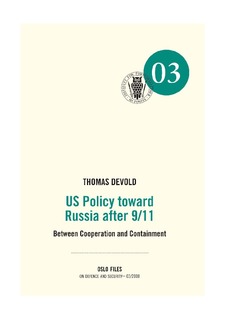US policy toward Russia after 9/11: between cooperation and containment
Others
Permanent lenke
http://hdl.handle.net/11250/99295Utgivelsesdato
2008Metadata
Vis full innførselSamlinger
Sammendrag
17 years after the breakup of the Soviet Union, the bilateral relationship between the United States and Russia is still one of the most important in world politics. Despite this, the US-Russia relationship seems to be described more often than not in terms of crisis and conflict. Russia has obviously contributed to this development, and the many deficiencies of contemporary Russian politics have been described amply before. This study takes a closer look at the American side of the relationship, and at the implications of US foreign policy on bilateral relations with Russia. The main argument is that US Russia policy has had a negative influence. Although the relationship seemed to be moving in a positive direction after the events of 9/11, several US actions, both in terms of its general foreign policy and its Russia policy, have undermined future positive developments and cut the relationship short of its considerable potential. The war on terror, which provided the initial impetus for closer US-Russia cooperation, ultimately highlighted disagreement and conflicting interests rather than facilitating further rapprochement. Many of these developments and the core issues of the bilateral relationship were often rooted in “hard security” issues. The Russian focus on this and their preoccupation with traditional security policy made cooperation resemble a zero-sum game, and it also diminished the level of trust in US-Russia relations, making cooperation in general more difficult.
